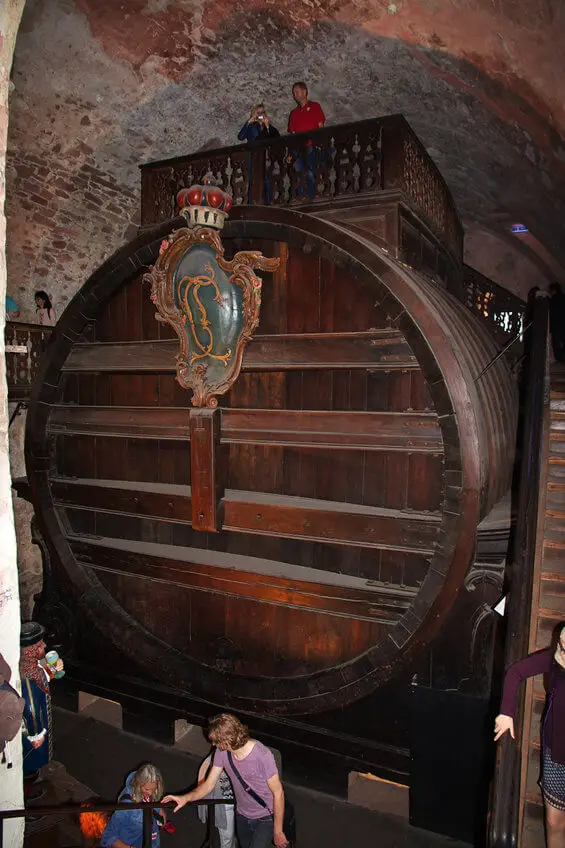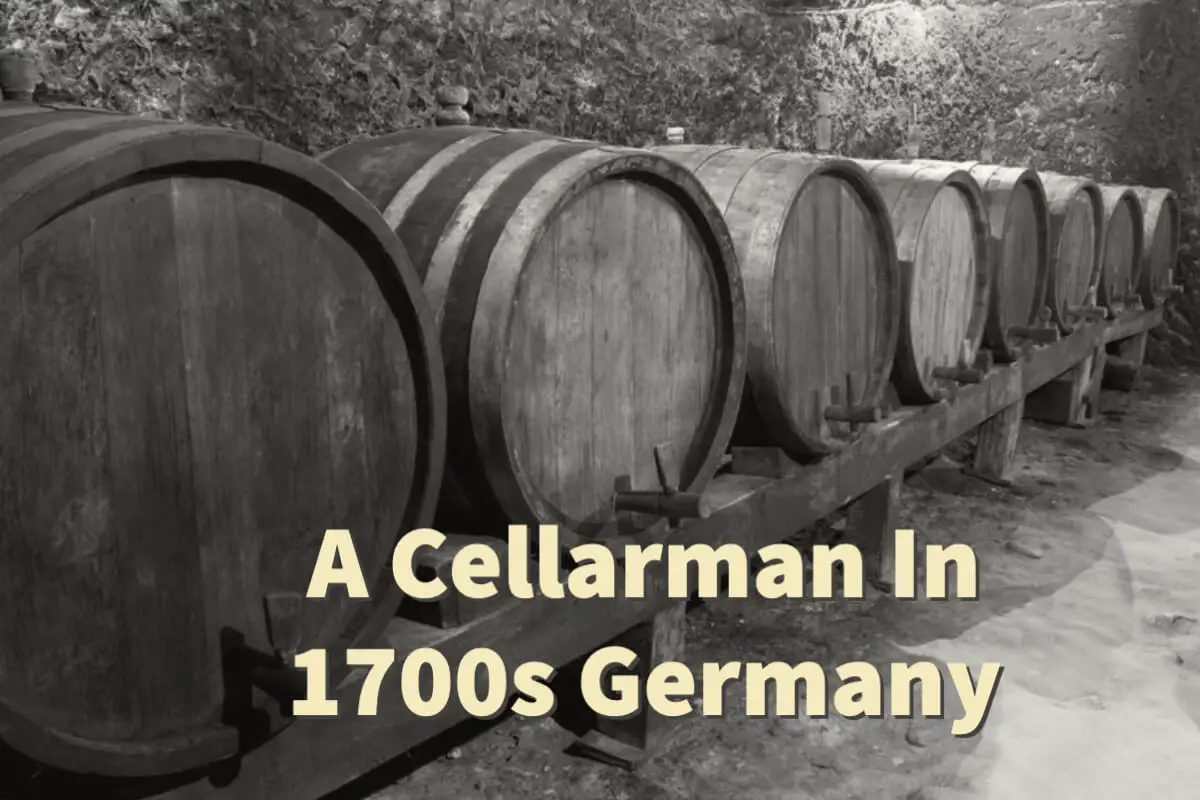As I was working on some of my family genealogy, I discovered that I had a great-great-grandfather who lived in Germany in the 1700s, and his occupation was a cellarman. II wanted to understand a bit more what a cellarman might have done in Germany in the 1700s
A cellarman in Germany in the 1700s would have worked with the beer or wine industry. A cellarman could have helped keep the vats of beer or wine in good repair; the cellarman would know when and how to transfer the beer or wine out of the vats or barrels. A cellarman could have also looked after the stock of wine in a cellar.
Table of Contents
- What Is a Cellarman?
- Brief History of Beer and Wine in Germany
- Wine In Germany In The 1700s
- A Cellarman in Germany – 1700s
- Frequently Asked Questions
- Related Content
My great-grandfather Wolfgang Gaistdorffer was born about 1730 in Grossapach, Germany, in the state of Wurttemberg. Germany. Parts of this area of Germany are still producing wine today.
What Is a Cellarman?
A Cellarman is still a job title used in breweries. Today, a cellarman would be responsible for cleaning and sanitizing the large vats, looking over the fermentation and conditioning of the beer. A cellarman would also be responsible for transferring beer from tank to tank.
But there is another definition of a cellarman that is still also used. A cellarman is a person who handles the supply in a pub or restaurant of all the alcoholic beverages. In other words, someone who works in the wine cellar and takes care of all the wine and beverages in the cellar.
Brief History of Beer and Wine in Germany
In the 1700s Germany, beer was a huge business throughout the German states. Farmers planted huge fields of barley and hops so that the beer could be produced and sold throughout the German regions.
Many people, especially some rich gentlemen, would build private brewhouses to brew their own beers. A cellarman would have been needed to work in those brew houses to either help ensure the quality of the production of the beer or to watch and guard the beer and move it when needed.
Germany also produced a lot of wine. The area where my relatives lived is near many of the wine-growing areas of Germany.
Germany started to produce wine about 70 to 270 AD, so Germany has a very long history of wine production. In fact, it was the Romans who brought wine production to Germany.
During the Roman conquest of Germany over 2,000 years ago, the Romans introduced to Germany winemaking. Monasteries became the center of the wine culture, and wine was the drink of almost all people throughout the Middle Ages.
It was the production of beer in Germany that ultimately helped the decline of wine in Germany. In the 1500s, due to climate change and improved brewing methods, vineyards in Germany decreased as beer production increased.

Wine In Germany In The 1700s
Even with the increase in beer production, Germany continued to produce a lot of wine. We can learn about the wine in Germany in the 1700s from the Heidelberg Tun or Grosse Fass. The Heidelberg Tun is a huge vat located in the Heidelberg Castle’s cellars.
There are 4 such large vats or barrels in the history of the Heidelberg; one of the large vats at the Heidelberg castle was built in 1751. The vat has a capacity to hold 221,726 liters or 58,574 gallons of wine. Over time the wood has dried, so the capacity for the vat has gone down slightly.
The German builders used 130 oak trees to construct this huge vat. And because it is such a large vat, it has rarely been used but has largely remained empty.
The American author Mark Twain said this of the Heidelberg tun:
“Everybody has heard of the great Heidelberg Tun, and most people have seen it, no doubt. It is a wine-cask as big as a cottage, and some traditions say it holds eighteen thousand bottles, and other traditions say it holds eighteen hundred million barrels. I think it likely that one of these statements is a mistake, and the other is a lie. However, the mere matter of capacity is a thing of no sort of consequence, since the cask is empty, and indeed has always been empty, history says. An empty cask the size of a cathedral could excite but little emotion in me.”
Mark Twain, A Tramp Abroad, 1880
A Cellarman in Germany – 1700s
It is more likely that my great-grandfather worked with wine than beer because of his location in Germany. He could have worked at a vineyard and looked over the vat as the Heidelberg Tun or worked for a brewery and looked over their beer production; we do not know exactly where he worked, but just that he worked as a cellarman.
But here is what we can suppose that a cellarman would need to be successful in their job, even in Germany in the 1700s:
- Trustworthiness- Watching over and working with large stocks of wine and beer would have been a job that required someone with reliability and a reputation of honesty. This is a job that would require a person had with impeccable character and excellent references.
- Basic Education Skills – Working as a cellarman even today requires some basic skills A cellarman in the 1700s would have to have some level of education. At the very least, be able to read the labels and understand a bit of math.
- Knowledge – To work as a cellarman, you must have knowledge. Whether it was for the beer or the wines, you would need to have a lot of knowledge to be able to do this job correctly.
When you think of the role of a cellarman in 18th century Germany, you may think it is a low-level job or occupation, but the truth is that this job would have been an excellent career. A person would have needed some knowledge, education, training, and trustworthiness to do this job.
The Hummel Family is a website all about Family History research. We focus on Swedish, German, English, Scottish, and American Genealogy. We also discussed Asia and China, as we had ancestors who spent many years in China.
You are welcome to join us and become part of our community by signing up for our FREE newsletter, The Hummel Family; sign up by clicking here.
Check out our YouTube channel, Family HIstory Buzz, by clicking here.
Frequently Asked Questions
What was the primary role of a cellarman in 1700s Germany?
A cellarman in 1700s Germany was primarily responsible for overseeing and managing the storage and maintenance of beer or wine in cellars.
Did a cellarman have specific duties related to beer or wine production?
Yes, a cellarman would have been involved in the beer or wine production process, ensuring proper storage conditions and overseeing the transfer of beverages between vats and barrels.
How did a cellarman contribute to the upkeep of beer or wine vats?
The cellarman would play a crucial role in maintaining the integrity of beer or wine vats, ensuring they were in good repair to preserve the quality of the beverages.
Were there specific skills required for a cellarman in the 1700s?
A cellarman would need a good understanding of brewing or winemaking processes, as well as knowledge of cellar management and maintenance.
What knowledge did a cellarman need for transferring beer or wine between containers?
A cellarman would need expertise in the proper techniques and timing for transferring beer or wine, ensuring the optimal flavor and quality of the beverages.
Did the role of a cellarman involve any record-keeping?
Yes, a cellarman would likely have been responsible for keeping records of the stock of beer or wine in the cellar, tracking quantities and ensuring proper inventory management.
Were cellarmen associated with specific types of establishments in 1700s Germany?
Cellarmen were commonly employed by breweries, wineries, or establishments involved in beer or wine production and storage.
Did cellarmen have any interaction with customers or the public?
While the primary focus was on the behind-the-scenes aspects of beer or wine production, cellarmen might have interacted with customers during cellar tours or tastings.
How did a cellarman contribute to the quality control of beer or wine?
A cellarman played a vital role in quality control by ensuring proper storage conditions, monitoring fermentation processes, and preventing contamination to maintain the quality of the beverages.
Related Content
What Does Swabia Mean?
Swabia is a region in southern Germany; the people in this region speak Swabian German. Though the region is today part of modern-day Germany, historically and culturally, it was different. The name Swabia came from the Duchy of Swabia.
You can learn more by reading What Does Swabia Mean? About Swabian German by clicking here.
What Is The History of Westphalia, Germany?
Westphalia’s history goes back to the times of the ancient Saxons. For a period of time, Westphalia was under the rule of Napoleon and the French. Later Westphalia became a state of Prussia until it officially became part of Germany in 1945.
You can learn more by reading A History of Westphalia, Germany by clicking here.
